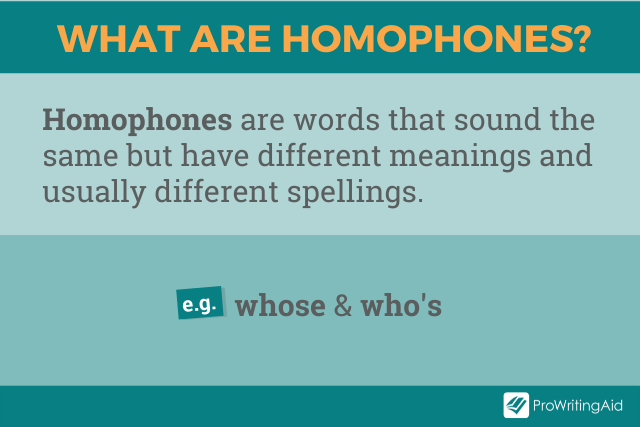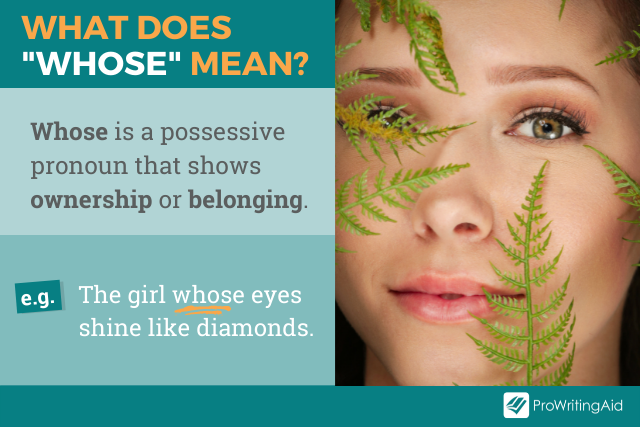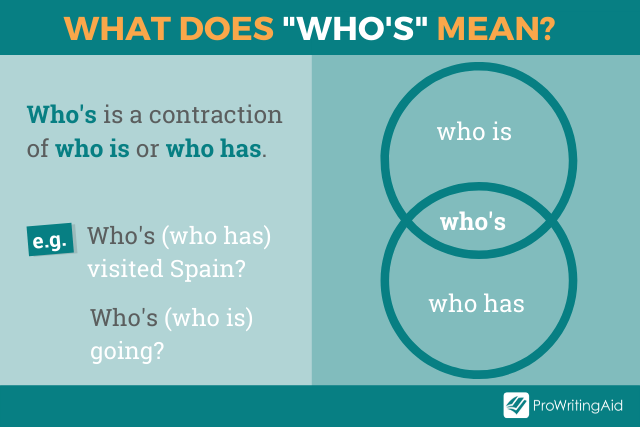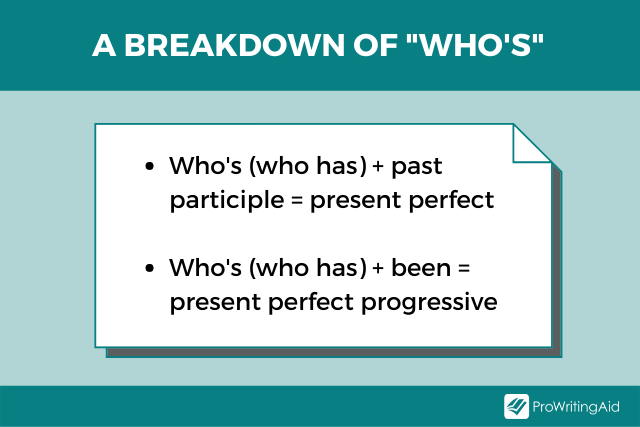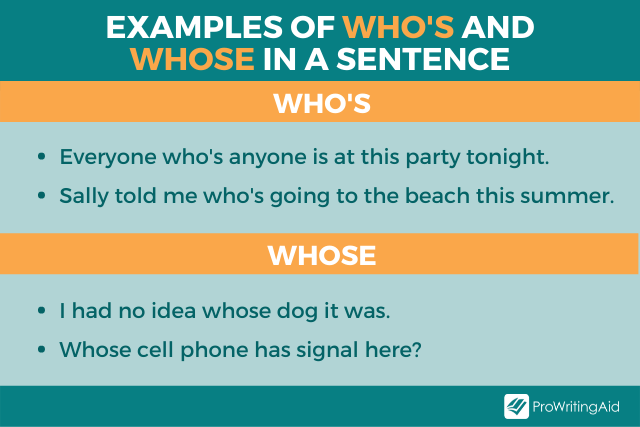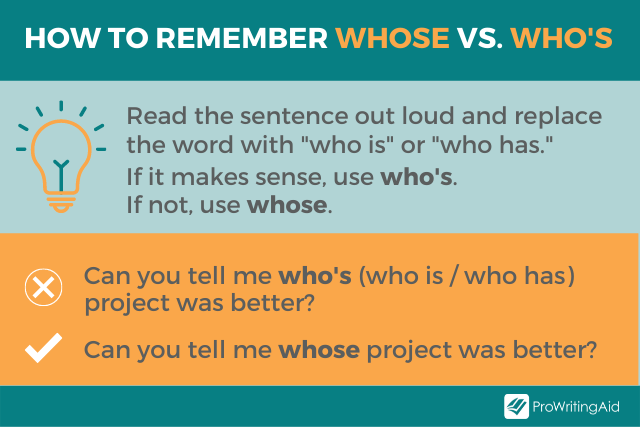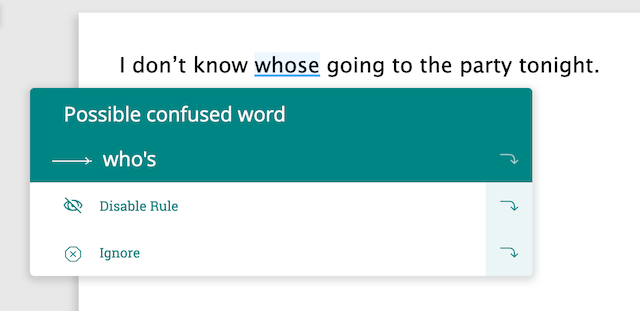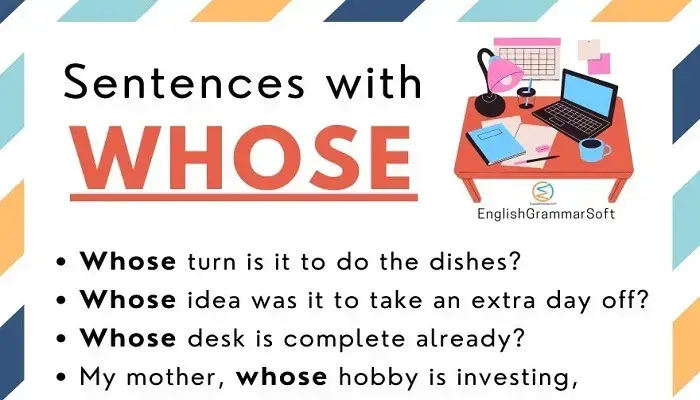 Pin
Pin
‘Whose’ is a relative pronoun used to express possession. You will find here 70 example sentences with whose.
You can use whose when you wish to say that something or someone belongs to or is related to a particular person
- Whose turn is it to do the dishes?
- Whose idea was it to take an extra day off?
- Whose desk is complete already?
- My mother, whose hobby is investing, regularly tries to get me involved in her newest market idea.
- You’d better apologize for whose money you borrowed for your vacation.
- It’s the man whose house it is.
- There was an older woman whose husband was a tailor.
- It’s a good thing to be in your debt, but not your debt whose icy foam turns men into moral monsters.
- The actor, whose career was over, is coming back.
- The man whose son is my boss got the promotion.
- The girl whose sister I met at the party had small eyes.
- The lady, whose name I forgot, came with her husband.
- Sally drove the car whose number had just passed me.
- This building is full of people whose names I don’t know.
- It is the bank whose codes were used was in Baltimore.
- This problem, whose solution requires skill and patience, is virtually impossible to solve.
- Hiroshima is the city whose name has become the symbol of humanity.
- An audience whose members tend to be quite critical determines whether a performance is good or bad.
- Whose shoes are the most comfortable?
- Do the children know whose birthday it is?
- The teacher knew whose work was best.
- The committee met to decide whose idea would be chosen.
- He did not wish to adopt the child whose mother had died in childbirth.
- I am told that there is a man whose face has been burned beyond recognition in your town.
- I didn’t realize whose house it was.
- I think that it’s the minister whose nephew killed someone.
- The bank whose money was stolen has claimed the insurance.
- The photo of the girl whose mother is a famous pop star is on the cover of this issue.
- Whose book is on your desk?
- Whose dirty dishes are these in the sink?
- The man whose coat you borrowed is my uncle.
- Whose car is parked outside?
- Whose clothes are these?
- Whose computer was hacked into?
- Whose team won the game?
- Whose idea was it to book the tickets six months in advance?
- It was a man whose ambition far exceeded his talent.
- She had a novel whose characters never really came to life.
- It was an actor whose performance was greatly appreciated by the audience.
- People whose houses were destroyed by the hurricane have been given free housing for six months.
- The company whose shares collapsed last month has had its financial figures taken into account by the purchasing committee at my firm, which led to a small amount of relief on my end.
- Many corporations whose stocks spiked earlier today announced late-night press conferences with their CEOs that should reveal why the sudden growth in their stock price.
- Into whose hands did they fall?
- To whose apartment did he come?
- Through whose eyes do I see the world?
- On whose authority do you act?
- Under whose direction will the work be done?
- In whose honor are we gathered tonight?
- Never squeeze the orange with whose skin has been peeled off due to health reasons.
- A word whose meaning changes depending on its use is called a relative pronoun.
- All of the people whose houses were burnt down were given new houses.
- Fries are the food whose consumption is most unhealthy in the USA.
- The portrait whose colors have faded was painted a long time ago.
- I’m looking for a book whose title begins with `H.’
- The teacher, whose car broke down, was caught by the bus.
- We stayed in a flat whose garden was full of noisy birds.
- The man whose house we burgled had been away for months.
- The woman whose husband I met at the dance looked very pretty.
- The coat with whose collar was covered in snow was mine.
- For whose tuition he was borrowing the money, the child had failed the exam again.
- For whose care she was making all the arrangements, the family had stopped contacting her.
- The lady whose husband works in a bank will leave tomorrow.
- The man whose daughter wants to be an actress will come tomorrow.
- The man whose son didn’t go to school will go to the party tonight.
- The woman whose sister is a nurse will call you tomorrow.
- The teacher whose car has just been towed off the school parking lot will be unhappy.
- The child whose house was broken into over the weekend will be scared for a long time.
- A child whose parents are divorced has to face the consequences.
- A person whose credit card is stolen is upset.
- A family whose home is threatened by fire is feeling distressed.
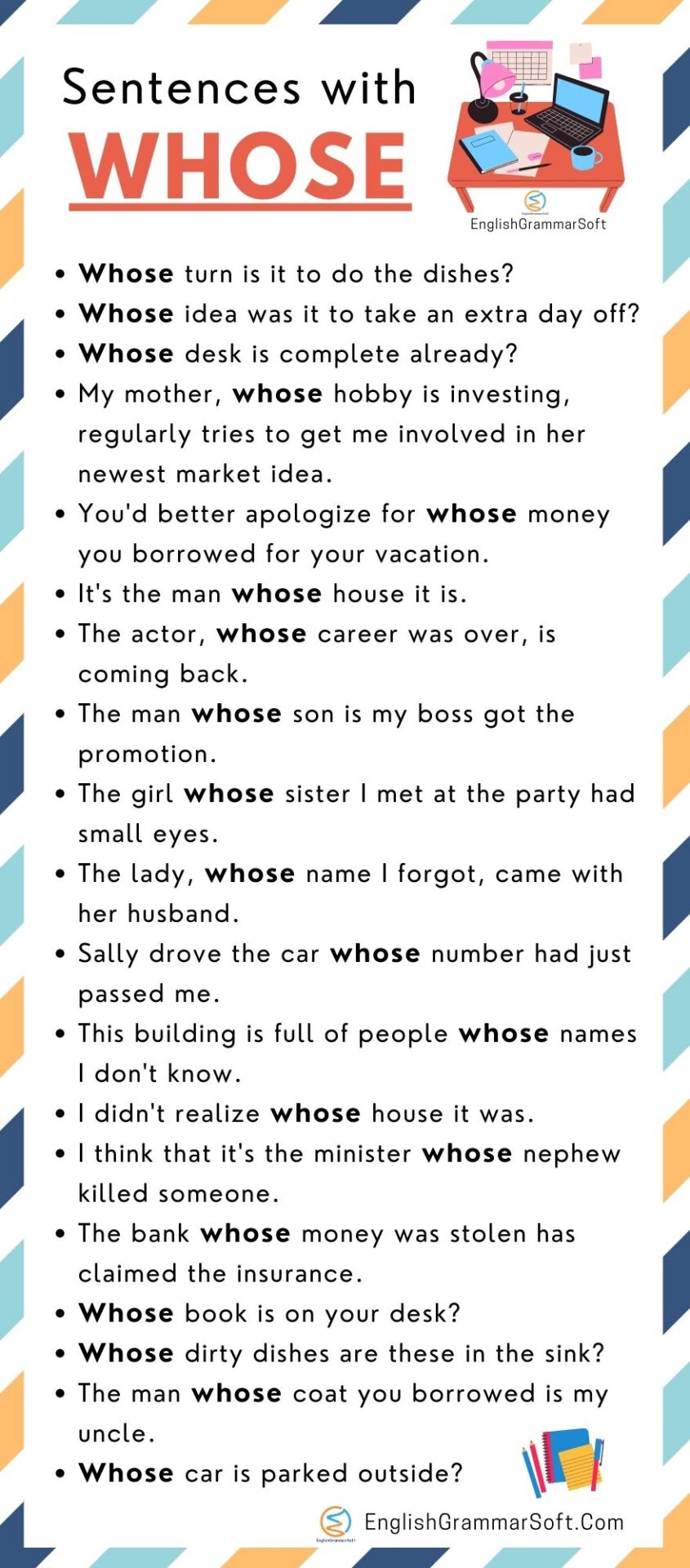
You may also like
- Sentences with Future Perfect
- Sentences with Past Perfect
- Conjunction Sentences (50 Examples)
- Sentences with Although Conjunction (87 Examples)
- No Sooner Than Sentences (31 Examples)
- Examples with Neither Nor (50 Sentences)
- Sentences with Commas (50 Examples)
- Sentences With Semicolons (;) 50 Examples
- Sentences with Apostrophes (Possession & Contraction)
- Example Sentences with Yet Conjunction
- Sentences with Either – or
- Sentences with Furthermore
- Sentences with Too
- Make Sentences with Too Many
- Make Sentences with Too Much
- Sentences with Juxtapose
- Sentences with Then and Than
- 50 Example Sentences with However
- 31 Example Sentences with Kinsmen
- Do Does Did Sentences (50 Examples)
- Has Have Had use in sentences | 50 Examples
- Was Were Sentences | 50 Examples
- There is – There are Sentences | 50 Examples
- Is am are sentences in English (50 Examples)
These examples may contain rude words based on your search.
These examples may contain colloquial words based on your search.
Suggestions
I can be friendly with people whose whose actions I don’t approve.
Я могу быть в дружеских отношениях с людьми, чьи поступки не одобряю 5.
Examples of such issues may include determining whose misconduct caused a loss and upon whose representations the user relied.
В качестве примера таких вопросов можно упомянуть установление того, чьи неправильные действия явились причиной ущерба и на чьи ручательства полагался пользователь.
Sick and wounded whose recovery within one year is not probable according to medical prognosis, whose condition requires treatment, and whose intellectual or bodily powers appear to have undergone a considerable diminution.
Больные и раненные, чье выздоровление в течение одного года невероятно согласно медицинскому прогнозу, состояние которого требует лечения и чьи интеллектуальные или телесные возможности, кажется, подвергаются значительному уменьшению.
They were the ones whose names are preserved in history and whose experience was more or less successful.
Они были теми, чьи имена сохранила история и чей опыт был более-менее успешным.
Unfortunately, there is no way to predict whose symptoms will decrease during adolescence and whose will return later in life.
К сожалению, нет никакого способа предсказать, чьи симптомы будут уменьшаться в подростковом возрасте и чья воля вернется позже в жизни.
Today it is «economic migrants» — whose labour is needed but whose presence is unwanted.
Сегодня это «экономические мигранты» — чей труд необходим, но чьё присутствие нежелательно.
In history there is always the question of whose manners and whose justice.
В истории это всегда зависит от того, чьи манеры и чья справедливость.
It’s possible because state governments control the process that shapes congressional districts — essentially determining whose vote is counted with whose.
Это возможно, потому что правительства штатов контролируют процесс, который формирует конгрессные округа — по существу определяющий, чей голос считается с чьим.
Use the products of responsible manufacturers, whose reputation has been tested for years, whose drugs have helped support the lives of many patients.
Пользуйтесь продукцией ответственных производителей, чья репутация проверена годами, чьи препараты помогли поддержать жизнь многих пациентов.
They differ on two main grounds: on whose behalf the transaction is at whose expense.
Они различаются по двум основным признакам: от чьего имени заключается сделка за чей счет.
The question is whose rules and whose values will run the world.
Борьба идет за то, чьи ценности, чьи правила будут господствовать в мире.
We know whose ready and whose not.
Разбираемся, чье занято, а чье — нет.
Everyone still knows whose cup is whose.
Все остальные будут знать, где, чья чашка.
Ficus, whose variegated leaves require more light than those whose leaves monochrome.
Фикусы, чьи листья пестрые, требуют больше света, чем те, чьи листья одноцветные.
I want a man whose actions match his words, whose integrity inspires others to step up their game.
Я хочу мужчину, чьи дела соответствуют его словам, чья честность вдохновляет других.
Everyone in its life meets interesting personalities, whose life, whose strong work ethic and talent does not leave others indifferent.
Каждый человек в своей жизни встречает интересных личностей, чья жизнь, чье трудолюбие и талант не оставляет равнодушным окружающих.
I call that man abnormal whose taking in is too much and whose giving out is unbalanced.
Я называю ненормальным того человека, который слишком много берет и отдача которого не уравновешена.
These are individuals whose perceptions are fresh, whose judgments are insightful, who may make important discoveries.
Это чьи представления свежие, решения которого являются проницательными, которое может сделать важное открытие.
The full-back, whose contract expires in 2021, is another player whose future needs sorting out.
Защитник, чей контракт истекает в 2021 году, является еще одним игроком, будущее которого находится под вопросом.
I’ve brought on writers whose portfolios were stellar, but whose actual work in the position wasn’t nearly as good.
Я привлек писателей, чьи портфолио были звездными, но чья работа на этой должности была не такой хорошей.
Suggestions that contain whose
Results: 137966. Exact: 137966. Elapsed time: 140 ms.
Documents
Corporate solutions
Conjugation
Synonyms
Grammar Check
Help & about
Word index: 1-300, 301-600, 601-900
Expression index: 1-400, 401-800, 801-1200
Phrase index: 1-400, 401-800, 801-1200
Whose употребляется и как местоимение, и как вопросительное слово. Мы задаем вопрос, начинающийся с «whose», когда хотим узнать, кому принадлежит что-либо, ассоциируется с ним или имеет непосредственную связь.
1. Использование «whose» в вопросах о принадлежности чего-либо кому-либо:
«I found this pen. Whose is it?» (Я нашел ручку. Чья она?)
«It’s mine. I lost it yesterday.» (Моя. Я потерял ее вчера.)
«I found this bag of books under the desk. Whose could it be?» (Я нашел эту сумку с книгами под столом. Чья это может быть сумка?)
«It must belong to one of the students.» (Должно быть, это одного из студентов.)
«I found these tools in the garage. Whose are they?» (Я нашел эти инструменты в гараже. Чьи они?)
«They’re Tom’s. I borrowed them from him to repair the windows.» (Это Тома. Я взял их у него вчера, чтобы починить окно.)
«Whose notebooks are these?» (Чьи это блокноты?)
«They belong to the journalist who was here this morning.» (Они принадлежат журналистам, которые были здесь сегодня утром.)
«Whose dog was run over in the street?» (Чью собаку сбили на улице?)
«It was my neighbour’s dog. She’s very upset.» (Это была собака моей соседки. Она очень расстроена.)
«Whose car was stolen from the car park?» (Чью машину украли с парковки?)
«The marketing manager’s.» (Менеджера по маркетингу.)
Заметка: В первых трех примерах «whose» использовалось в качестве местоимения. В трех последних примерах «whose» является определительным словом перед существительным.
Не забывайте о написании этого слова. Часто его путают c «who’s», которое представляет собой сокращенную форму от «who is».
2. Использование «whose» в вопросах о связи или ассоциации кого-либо с чем-либо:
«Whose fault was it?» (Чья это была вина?)
«We don’t know yet. In fact, the fire could have been accidental.» (Мы еще не знаем. Фактически, пожар мог произойти случайно.)
«Whose responsibility is it to lock up the office after the cleaners have gone?» (Кто ответственен за закрытие офиса после того, как уйдут уборщики?)
«The caretaker should do that.» (Сторожа должны это делать.)
«Whose job is it to send out information to shareholders?» (Кто должен отсылать информацию акционерам?)
«It’s the managing director’s secretary who does that.» (Секретарь главного менеджера должен это делать.)
3. Можно также использовать «whose» само по себе, особенно при ответе кому-то:
«I know whose car that is.» (Я знаю, чья это машина.)
«Whose?» (Чья?)
«It belongs to the new designer.» (Она принадлежит новому дизайнеру.)
«I’ve found out whose dog it was that attacked you.» (Я понял, чья собака на тебя напала.)
«Whose?» (Чья?)
«It’s our new next-door neighbour’s.» (Это собака нашего нового соседа.)
Диалоги
Mobile dispute (Спор о мобильниках)
— Whose mobile rang just now? (Чей мобильник только что звонил?)
— It was mine. Why? (Мой. А что?)
— You’re supposed to switch it off in here. (Его необходимо выключить здесь.)
— Who says? (Кто такое сказал?)
— It’s a school rule. (Это школьное правило.)
— I was told that that just applied to the classrooms. This is the common room. (Мне сказали, что это применимо только к классным комнатам. Это обычная комната.)
— Whoever told you that? (Кто тебе это сказал?)
— I don’t remember. In any case, who cares? There are no teachers here. (Не помню. В любом случае, какая разница?)
— A lot of the other students will be annoyed if you use it in here. Some of them come here to do some extra studying. (Многих школьников будет раздражать, если ты будешь пользоваться им здесь. Некоторые приходят сюда, чтобы учиться.)
— Well, I come here to relax and read magazines. Whose books are these on this chair? (Что ж, я прихожу сюда отдыхать и читать журналы. Чьи это книги на стуле?)
— They’re mine. I’ll just move them. (Мои. Я сейчас уберу их.)
— Thanks. By the way, whose job is it to tidy up in here? (Спасибо. Кстати, кто убирается здесь?)
— The school cleaner cleans it, but we’re all responsible for keeping it tidy. Who left those dirty coffee mugs there? (Школьная уборщица, но мы все ответственны за то, чтобы здесь было чисто. Кто оставил здесь пятна от кофе?)
— Who knows? The place was empty when I came in. (Кто знает? Здесь было пусто, когда я вошел.)
A missing letter (пропущенное письмо)
— Who’s that man in the waiting room, Mrs Smith? I assume he’s a parent. (Что за мужчина находится в комнате ожидания, миссис Смит? Предполагаю, что это родитель.)
— That’s Mr Brown, Mr Jackson. (Это мистер Браун, мистер Джексон.)
— Whose father is he? We have several students called Brown. (Чей он отец? У нас тут несколько учеников с фамилией Браун.)
— He’s Jack Brown’s father in Year 3. Mr Brown’s here to complain about not receiving a letter he wrote about bullying. (Он отец Джека Брауна из третьего класса. Мистер Браун пришел, чтобы пожаловаться на то, что вы не получили его письмо о запугивании.)
— To whom did he send the letter? I certainly have never seen such a letter. (Кому он отсылал это письмо? Я никогда не видел такого письма.)
— He said that he addressed it to you, Mr Jackson, but I haven’t seen it either. Who opened your mail when I was on holiday last week? I know the temp only worked in the afternoons. (Он сказал, что адресовал его Вам, мистер Джексон. Но я его тоже не видела. Кто открывал вашу почту, пока я была в отпуске на прошлой неделе?)
— I opened the letter myself and there was none from Mr Brown. Who is said to be bullying whom? (Я открывал письма сам, и не было ни одного от мистера Брауна. Кто кого запугивал?)
— Mr Brown says that Jack is being bullied by Tom White and Bill Jones. (Мистер Браун говорит, что Джека затравливают Том Уайт и Билл Джонс.)
— Well, I won’t tolerate bullying in this school. Please ask Mr Brown to come into my office, Mrs Smith. (Что ж, я не терплю травлю в этой школе. Пожалуйста, попросите мистера Брауна зайти в мой офис, миссис Смит.)
— Certainly, Mr Jackson. (Конечно, мистер Джексон.)
What Is the Difference Between Whose and Who’s?
Whose vs. who’s is one of the easiest mix-ups in English. Even though both words contain «who,» they have different meanings and are different parts of speech. This difference means that the two words can’t be used interchangeably.
In short, the difference can be summed up like this:
- Whose is a possessive pronoun indicating who owns something
- Who’s is a contraction that is short for «who is» or «who has.»
To better understand the difference between whose vs. who’s, we need to dive deep into the definitions of each word, as well as their grammar functions. Let’s get started!
Whose and who’s are tricky homophones. These words sound alike, but they don’t have the same meaning at all.
Keep reading to learn more about the difference between whose and who’s.
What Does Whose Mean?
Whose is used to indicate that something belongs to or is associated with a person or thing that has previously been mentioned.
- The dog, whose paw prints were all over the carpet, looked guilty.
Here, whose means that the dog is associated with the paw prints—he left them on the carpet.
Because whose doesn’t give us enough information on its own to work out who someone is talking about, it is used after you have already mentioned a specific thing or person, or in a question when you don’t know who you are talking about.
This gets easier with examples:
- The man, whose hair was bright orange, stood out from the crowd.
In this sentence, whose shows that the hair being talked about belongs to the man. Without referencing the man first, we wouldn’t know what subject whose was referring to.
But if we want to know who something belongs to, we can use whose in a question, like this:
- Whose paw prints are these?
What Kind of Word Is Whose?
Okay, now we’re going to get a bit more grammatical.
Whose is technically always a possessive pronoun. That means that it shows possession or ownership. For example, in the question «Whose phone is this?» you’re asking who owns the phone.
However, whose is also often used as a possessive adjective. What does this mean? It takes a few steps to explain.
A pronoun (like he, she, it) is a word that replaces a noun (a thing, person, or idea), especially a proper noun (a name).
Whose is a possessive pronoun, which means it shows possession or ownership. It replaces the person or thing to whom something belongs in a sentence.
Look at the following example.
- The girl whose eyes shine like diamonds
In this example, whose is showing that the eyes belong to the girl. But it’s also doing something else. At the same time, it is telling us which girl we are talking about by describing her.
Because of this dual function, this possessive pronoun is also functioning like a possessive adjective. It’s a stand-in for the girl, like a pronoun, but it is describing ownership of the eyes, like an adjective.
When whose comes before a noun in this way, it functions like a possessive adjective. When there is no following noun, it functions solely as a possessive pronoun.
An example of this would be asking:
- Whose is it?
Whose is replacing a specific noun, and we would need more context to know what object is being referenced.
Whew. That’s a lot of definitions.
In short, whose is a possessive pronoun that indicates ownership or belonging.
How Do You Use Whose in a Sentence?
Let’s look at some examples of how to use whose in your writing.
- Do you know whose birthday is is?
- I had no idea whose dog it was.
- Don’t get caught up in whose fault it was.
- «Whose are these?» Mom asked, holding up a pair of socks.
- Whose cell phone has signal here?
- Let me know whose proposal you choose.
- Whose idea was the best?
- Can you tell me whose project was better?
Notice that each of these sentences references a noun or pronoun in the possessive form. It’s talking about possession, which is why we are using whose.
What Does Who’s Mean?
Who’s, on the other hand, is a contraction. Who’s can mean both «who is» or «who has.»
A contraction is a way to combine and shorten words, usually two words or more. We speak in contractions often, so it’s important to use them in informal or conversational writing.
Who’s is a combination of «who» plus the verb «is» or «has.»
Who is also pronoun but it isn’t the possessive form like whose. Instead, it is a questioning or interrogative pronoun (which means it is used to ask a question).
The apostrophe in who’s replaces part of the verbs is or has in the phrases who is and who has.
To determine whether the contraction means who is or who has, the context of the rest of the sentence or conversation is crucial.
When who’s means who is, it’s dealing with the present tense. The word «who» is followed by either a verb, adverb, or adjective, like in the examples below.
- Who’s going? / Who is going?
- Who’s here? / Who is here?
- Who’s knowledgeable about computers? / Who is knowledgeable about computers?
When who’s means who has, it can have two functions: the third-person singular form of the present perfect tense or the third-person singular form of the present perfect progressive tense.
Present perfect is a tense that references something that occurred in the past at an unspecified time or began in the past. When this is the function of who’s, it precedes a verb.
- Who’s written a novel before? = Who has written a novel before?
- Who’s visited Spain? = Who has visited Spain?
Who’s as present perfect can go one step further and be part of present perfect progressive. Don’t worry too much about these terms—present perfect progressive just means something that started in the past and continues in the present. In this case, who’s will precede «been.»
For example, «Who’s been a writer for more than five years?» We know this sentence contains the contraction for «who has» because it’s asking about someone who started being a writer in the past and is now still a writer in the present.
How Do I Use Who’s in a Sentence?
Now let’s look at some examples of how to use who’s in a sentence. Since who’s can be a contraction for two words—»is» and «has»—we need examples of both.
We’ll divide these up between «who is» and «who has» to really help you understand how who’s is used.
Here are some examples where who’s is a contraction of «who is.»
- Who’s a good dog?
- Have you heard who’s speaking at the convention?
- Sally told me who’s going to the beach this summer.
- Who’s hungry for pizza?
- Do you know who’s behind all the murders?
- Who’s your professor for political science?
- We need to know who’s attending the wedding by June 4th.
- Everyone who’s anyone is at this party tonight.
If you read all of the examples above and replace who’s with «who is,» they’ll still make sense. But what about the other use of who’s?
If a sentence uses the present perfect or present perfect progressive tense, who’s is a contraction for «who has.» Here are a few examples.
- Who’s attended Comic-Con before?
- She wants to know who’s been at the company the longest.
- Who’s got a calculator?
- Ask who’s seen all the Marvel movies.
- Who’s been to this restaurant before?
- Who’s received their tax return?
- I wonder who’s gotten their college acceptance letters.
- Who’s been your biggest influence in your career?
While replacing who’s with «who is» doesn’t make sense, «who has» does. That’s how we know to use_ who’s_ in each of these sentences.
How Can I Remember the Difference Between Whose vs Who’s?
Those were some pretty technical definitions of whose and who’s. When you’re in the flow of writing, you might not think about the intricacies of grammar, like parts of speech and verb tenses.
So what’s an easier way to remember the difference between whose vs. who’s_ in the moment?
If you’re looking at your writing and can’t decide whether to use whose or who’s, read the sentence out loud and replace the word in question with «who is» and «who has.»
If it makes sense with one of those, you’ll use who’s. If it doesn’t make sense, use whose.
Typos are embarrassing. If you’re worried about using the wrong word, use ProWritingAid to highlight confused words as you write.
Download the free browser extension to catch this and 1000s of other errors wherever you write.
Whose vs. Who’s Test
Are you ready to test your knowledge in the great battle between whose vs. who’s? Take a look at these example sentences and decide whether to use who’s or whose.
- Whose/Who’s going to be at the party?
- Whose/Who’s fingerprints are those?
- We don’t know whose/who’s involved in the scandal.
- Ask them whose/who’s been married the longest.
- Everyone loves a person whose/who’s smile lights up a room.
ANSWERS:
- 1,3, and 4: «who’s»
- 2 and 5: «whose»
How did you do?
That’s everything you need to know about these tricky homophones. We hope you have a greater understanding of the difference between whose vs. who’s.
Take your writing to the next level:
20 Editing Tips from Professional Writers
Whether you are writing a novel, essay, article, or email, good writing is an essential part of communicating your ideas.
This guide contains the 20 most important writing tips and techniques from a wide range of professional writers.
Who’s is a contraction of “who is” or “who has”. “Whose” is a question word we use to ask who owns something.
Both who’s and whose come from the pronoun that is who. Both words sound exactly the same when you are speaking, but the spelling is where the difference comes in. These two words are so similar that even the best writers can have a hard time remembering which is which.
The rules of when to use each word are pretty simple once you understand them, but until then the words can bring you a lot of confusion.
The words are homophones, but they can’t be used interchangeably as most people think. They have different meanings as who’s is two words crunched into one and whose is just one word.
Who’s Meaning and Use
Who’s is a contraction of the words who is or who has. The apostrophe in the word represents the letters that are missing from is and has when the two words are combined. You will use who’s when you would normally say who is or who has.
Examples
Who’s going to the dinner party?
Who’s seen that movie already?
Who’s picking you up from the airport?
Who’s the best person to help me with my math?
Whose Meaning and Use
Whose is considered to be a possessive pronoun. You will use this word when you are asking who owns something. For example, if you are asking who the nice car, you would say, “Whose nice car is that?”
You would also use this word when you find something, and you don’t know who it belongs to. Asking whose item it is will be the proper way to find out who owns it, not who’s.
Examples
Whose kitten is this?
Whose car are we taking?
Whose shoes are in the middle of the floor?
Whose homework is this?
Determining which word you are supposed to use can be difficult, but it doesn’t have to be. Take a look at some of these examples that can help you out!
Example: Who is in third place?
Correct: Who’s in third place?
Incorrect: Whose in third place?
Example: Who owns these shoes?
Correct: Whose shoes are these?
Incorrect: Who’s shoes are those.
Example: Who is staying for dinner?
Correct: Who’s staying for dinner?
Incorrect: Whose staying for dinner?
Example: Who owns the car blocking the driveway?
Correct: Whose car is blocking the driveway?
Incorrect: Who’s car is blocking the driveway?
Remembering the Difference
Who’s and whose get mixed up just like the words it’s and its. It’s is a contraction of it is or it has, and its is the possessive form, just like who’s and whose. One simple way to keep these words apart is by remembering that possessive adjectives don’t usually have an apostrophe (mine, yours, theirs, etc.).
It can be overwhelming trying to remember the difference between these two words, but it doesn’t have to be. There are a few tricks that you can keep in mind to help you remember which to use when.
First, say what you are trying to say out loud. If you can say who is or who has and the sentence still makes sense, use who’s. If the sentence doesn’t make sense, use whose.
Next, think of what comes after the word. Whose is a possessive word and will usually be followed by a noun. If a noun comes immediately after the word, you should use whose. If there’s no noun, use who’s.
Finally, consider whether or not the word you are using is supposed to be a contraction. Who’s is a contraction, while whose is not. The apostrophe in the contraction stands for the missing letters, and whose doesn’t have any.
- Author
- Recent Posts
Conor is the main writer here at One Minute English and was an English teacher for 10 years. He is interested in helping people with their English skills and learning about using A.I tools at work.

